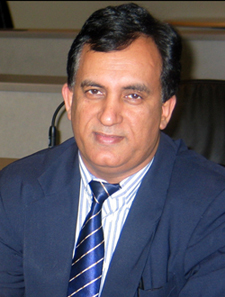 |
Surinder Batra, Ph.D. |
This year, UNeMed will be hosting a campuswide event to honor UNMC inventors with issued patents and licensed technologies. The campus is invited to the 4 p.m. ceremony in the Durham Research Center Auditorium. A reception will follow in the DRC Atrium.
Among UNMC’s most accomplished inventors, Surinder Batra, Ph.D., knows the protection of preliminary ideas is critical if scientific discoveries are to move into the marketplace.
Dr. Batra, professor of biochemistry and molecular biology at UNMC, credits UNeMed among the reasons for his entrepreneurial research success related to pancreatic cancer. As the technology transfer partner of UNMC, UNeMed works with researchers to evaluate, protect and license the innovative discoveries made on campus.
“Dr. Batra is one of UNMC’s most prolific inventors with 11 New Invention Notifications (NINs) in the past 10 years,” said James Linder, M.D., president of UNeMed.
These NINs have resulted in 13 U.S. and foreign patents and patent applications and six have matured into issued U.S. patents.
“That’s a big step,” Dr. Linder said, noting four of these patents have issued in the past 1 1/2 years.
Wholly-owned by the University of Nebraska, UNeMed was incorporated in 1991 to commercialize new technologies developed at UNMC. With more than 200 funded investigators at UNMC, any of them — graduate students, fellows or other UNMC staff — have the potential to be inventors.
“Success is the result of many factors including good luck, hard work, good colleagues in the group, in the department and at the institution,” Dr. Batra said. “I got cooperation from all sources at all times and UNeMed assisted in a very positive way, protecting inventions the best they could during the past six years.
“We should emphasize the protection of preliminary ideas and have peer-reviewed seed funding for the expansion of those ideas to facts,” he said.
A native of Ambala Cantt, India, Dr. Batra joined UNMC in the fall of 1996. His research is focused on identifying, developing and validating markers for the early diagnosis and treatment of pancreatic cancer. These markers also are studied for their roles in the progression and metastasis of cancer.
“UNeMed has executed two intellectual property licenses in the past year allowing commercial sales of his MUC4 antibody,” Dr. Linder said.
Dr. Batra’s four patents are outlined below, as well as their applications in the marketplace:
- US Patent No. 7,166,704 titled: “Antibodies Immunologically Specific for PD2, a Protein that is Amplified and Overexpressed in Pancreatic Cancer,” issued Jan. 23, 2007. PD2 is deregulated in pancreatic and many other cancers. Antibodies and probes are useful in diagnosing and treating cancers.
- US Patent No. 7,052,859 titled: “Specific Mucin Expression as a Marker for Pancreatic Cancer,” issued May 30, 2006. MUC4 is expressed in pancreatic cancers, compared to no expression in the normal pancreas and benign pancreatic diseases. Therefore, MUC4 is an attractive marker for early diagnosis of this lethal cancer.
- US Patent No. 7, 105,657 titled: “Compositions and Methods for Inhibiting Pancreatic Cancer Metastasis,” issued Sept. 12, 2006. MUC4 is associated with the progression and metastasis of pancreatic cancer. As a result, this is a target for pancreatic cancer therapy.
- US Patent No. 7,078,188 title: “MUC17 Encoding Nucleic Acid Sequences, Polypeptides, Antibodies and Methods of Use Thereof,” issued July 18, 2006. MUC17 is associated with gastrointestinal (GI) diseases and cancers. It is an attractive target for inflammatory diseases of the GI tract. The probes and antibodies are helpful for designing therapeutic strategies.
Dr. Batra — named one of UNMC’s Distinguished Scientists for 2006 — encourages his colleagues to contact UNeMed to see how they can assist them with their discoveries.
“They should approach them with the results they have and take risks on some projects if observations are unique,” he said.
That’s what happened with the research he and Tony Hollingsworth, Ph.D., collaborated on.
“We got unique observations over 10 to 15 years ago and we were persistent,” he said. “UNMC helped in 1997 and we published the paper in 2006. We believed in it, and are now working on it with full force.”
Moving his MUC4 antibody research into the commercial sector is exciting, Dr. Batra said.
“It has great potential for early diagnosis of many cancers and can be used to follow the cancer progression and affect therapy,” he said.
The process of taking disclosures and creating commercial interest is important in order to protect intellectual property, said Dr. Batra, advising colleagues to “work hard, persevere, trust observations and be open for discussion on ideas with students, post-docs and faculty members.”